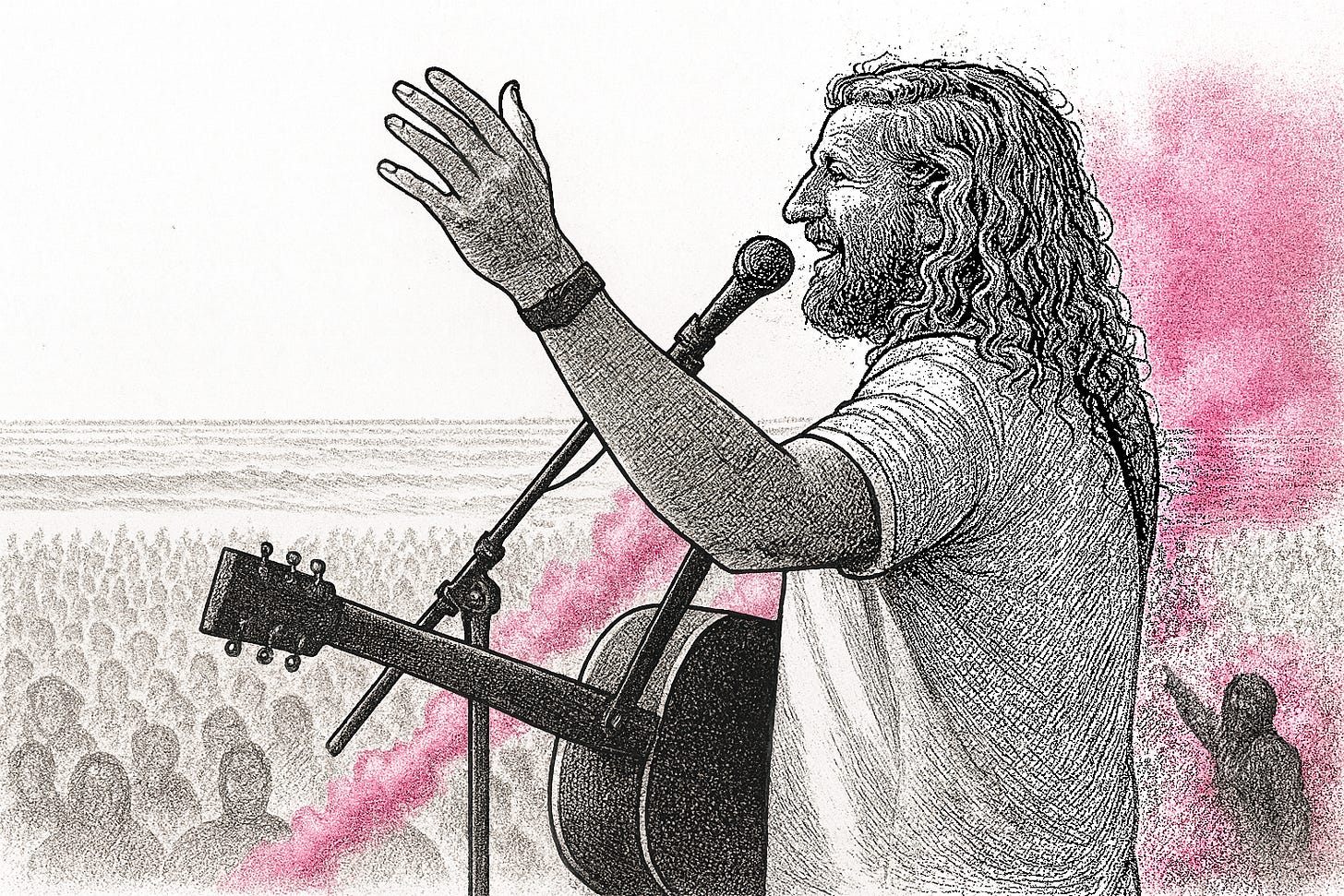Please subscribe, comment, like, and share.
Attendees in Montreal were met with confusion and heightened security in July 2025 when multiple planned concerts by American worship singer Sean Feucht were abruptly canceled by authorities. Parks Canada and various municipalities revoked permits for six events across Eastern Canada, citing safety and concerns following a protest-related smoke bomb incident and a suspicious bus accident involving Feucht’s team near Toronto.
The most widely reported protest incident occurred on July 25, 2025, during Feucht’s Montreal concert at the Old Port. According to eyewitness accounts and event footage, a protester threw a pink “gender reveal” style smoke bomb toward the stage area, filling the air with thick colored smoke. No injuries were reported, and the program continued. (See video: https://x.com/Protestia/status/1948907375999775228 )
However, as of early August 2025, authorities have not announced any arrests in connection with the smoke bomb incident (Protestia, July 26, 2025). Separately, a bus transporting Feucht’s group was involved in a traffic accident under circumstances described as suspicious by event organizers, but no charges or direct links to protest activity have been confirmed by police.
Civil liberties organizations and religious freedom advocates responded swiftly to the shutdowns and fines. The Canadian Constitution Foundation (CCF) publicly stated it is “disturbed by the cancellation of Christian singer Sean Feucht’s concerts and the $2,500 fine levied against a church that hosted his event,” calling the measures “an alarming infringement of the freedom of religion, expression and assembly protected by the Charter” (Canadian Constitution Foundation).
Local officials justified their actions primarily on public safety grounds. While Feucht has faced allegations of making anti-diversity, anti-2SLGBTQ+, and anti-women’s rights statements, authorities have not confirmed that hate speech laws were directly invoked as a basis for permit revocation or fines. The City of Montreal, for example, stated that the $2,500 fine issued to Ministerios Restauración Church, which hosted a last-minute concert replacement, was for operating without a valid event permit (Global News, July 31, 2025).
Canada’s Charter of Rights and Freedoms protects freedom of religion (section 2(a)) and expression (section 2(b)), subject to “reasonable limits prescribed by law as can be demonstrably justified in a free and democratic society” (section 1). Criminal Code and human rights statutes restrict only speech that promotes hatred against identifiable groups—a high threshold that has not been met in this instance, according to current public records and court rulings.
A key case that frames these debates is the 2021 Supreme Court of Canada decision in Ward v Quebec. The Court clarified that limits on speech are only permitted when “there are serious reasons to fear harm that is sufficiently specific and cannot be prevented by the discernment and critical judgment of the audience.” The ruling also confirmed that, in Canadian democracy, there is no legal right “not to be offended,” and that preventing emotional harm alone does not justify censorship. This standard sets a high bar for government intervention and underscores that authorities must demonstrate real, specific harm beyond the possibility of people being offended (Ward v Quebec, 2021 SCC 43).
Legal observers note the distinction between Canadian and U.S. approaches: while the U.S. Constitution’s First Amendment offers broad protections for religious and political speech, including events in public forums, Canada allows for a balancing of free expression with public order, safety, and anti-hate considerations. Permit denials and fines, such as those issued in Montreal, would need to be justified in court as necessary and proportionate under the Charter’s section 1 test, and consistent with the Supreme Court’s guidance in Ward.
The Canadian Constitution Foundation and other advocacy organizations have signaled the possibility of legal action, challenging the event cancellations and fines as unconstitutional restrictions on religious assembly and free speech. Any court challenge would require authorities to present evidence that the limits imposed were both reasonable and justified by public safety needs, especially in the wake of the protest incidents.
With no formal litigation announced as of August 2025, the case remains a closely watched test of the boundaries between public order, protest, and the rights of religious groups to assemble and express their views—even when those views are the subject of controversy or protest.
Legal Analysis
The Canadian legal system allows governments to impose limits on speech and religious expression if they can demonstrate those limits are reasonable and justified, especially in the context of public safety or community harmony. The Supreme Court’s decision in Ward v Quebec makes it clear that government cannot suppress speech simply because it is offensive or causes emotional discomfort. Only specific and serious harm—beyond what listeners could reasonably judge for themselves—can justify government restrictions.
Yet, it is important to recognize that Canadian law gives the government broader authority to restrict fundamental freedoms than is permitted under American constitutional law. In the United States, the First Amendment draws a much firmer line: government cannot restrict speech based on content or viewpoint in public spaces unless it can prove an immediate threat of violence or unlawful action. This higher threshold exists to protect robust debate, including religious and controversial viewpoints, from government suppression.
When the government is allowed to curtail speech based on broad or speculative concerns, there is always a risk that dissenting or minority voices will be stifled—not just in high-profile religious controversies, but in other matters of public debate.
While the Canadian approach aims to balance individual rights with collective interests, the American model is more protective of individual freedom of expression—even when that speech is deeply unpopular or provocative. In practice, this means governments in Canada have more legal room to cancel events, deny permits, or fine organizers for reasons tied to public order or anticipated controversy. However, history has shown that granting government the power to limit expression—even for well-intended reasons—can undermine the very freedoms democracy is meant to protect.
This is not a minor difference. When the government is allowed to curtail speech based on broad or speculative concerns, there is always a risk that dissenting or minority voices will be stifled—not just in high-profile religious controversies, but in other matters of public debate. The events surrounding the Feucht concerts highlight why many legal scholars and civil liberties advocates argue that the strongest protection for a free society is to restrict government power to limit speech, rather than to trust that such power will only be used wisely.
If the Feucht matter goes to court, Canadian judges will have to weigh the evidence and decide whether the government’s response was justified under the Charter and Ward. But the broader lesson is clear: robust freedom of expression is best served by laws that err on the side of allowing speech—however controversial—rather than empowering the state to decide whose views can be heard.
No lawsuit has been filed as of August 1, 2025 although Sean Feucht has indicated he intends to do so on his social media account.
See For Yourself
Feucht’s full concert in Toronto is available on YouTube (see below) if you’re interested in seeing for yourself what the events were actually like:
Attribution:
-
“Protester Throws Smoke Bombs at Worship Leader Sean Feucht Mid-Concert,” Protestia, https://protestia.com/blog/2025/07/26/protester-throws-smoke-bombs-at-worship-leader-sean-feucht-mid-concert/
-
“CCF disturbed by cancellations, fine levied against Christian singer,” Canadian Constitution Foundation, https://theccf.ca/ccf-disturbed-by-cancellations-fine-levied-against-christian-singer/
-
“Canadian Charter of Rights and Freedoms,” Government of Canada, https://laws-lois.justice.gc.ca/eng/const/page-15.html
-
“Sean Feucht concert: Montreal church fined $2,500,” Global News, https://globalnews.ca/news/11306371/que-sean-feucht/
-
“Sean Feucht’s Canada concerts canceled amid protests, safety concerns,” The Roys Report, https://julieroys.com/sean-feucht-canada-concerts-canceled/
-
Ward v Quebec, 2021 SCC 43, Supreme Court of Canada, https://www.canlii.org/en/ca/scc/doc/2021/2021scc43/2021scc43.html
Tags: Sean Feucht, Charter of Rights, Ward v Quebec, Canadian Constitution Foundation, free speech litigation

